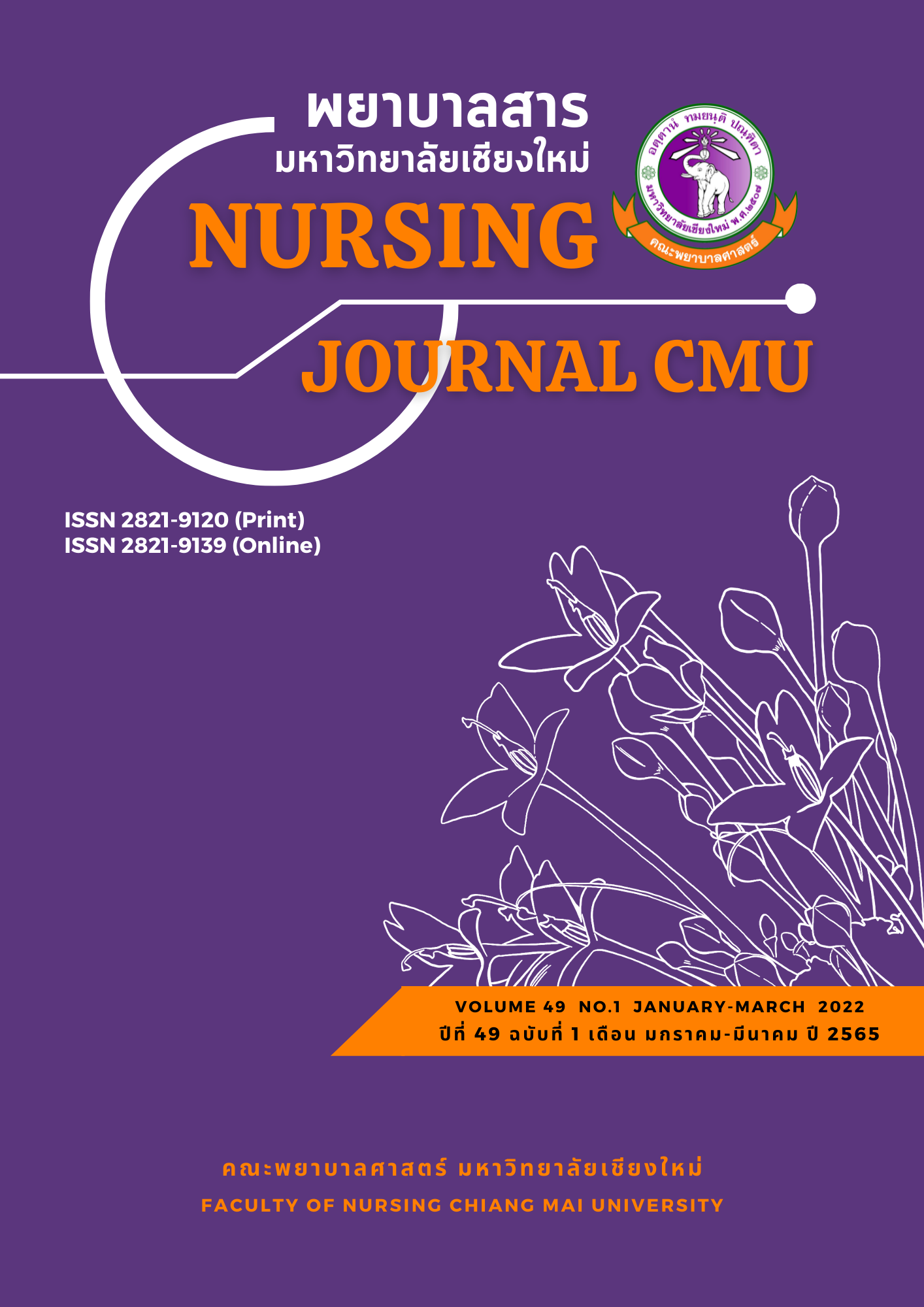Factors Related to Self-management Behaviors Among Pregnant Women at Risk of Gestational Diabetes Mellitus
Keywords:
Self-management behaviors, Knowledge of gestational diabetes, Perception of pregnancy risk, Self-efficacy, Social supportAbstract
Currently, pregnant women who are at a high risk for gestational diabetes tend to increase this risk due to lifestyle changes. Self-management concepts in health care can promote self-control behaviors and reduce the risk of gestational diabetes. This correlational descriptive research aimed to study factors related to the self-management behavior of pregnant women at risk of gestational diabetes. The sample was made up of 85 cases selected from the antenatal care unit at a secondary hospital in Chiang Rai. The research instruments included the Gestational Diabetes Knowledge Questionnaire, a self-efficacy perception questionnaire, and a self-management behavior questionnaire. The content validity index was 0.88, 0.94 and 0.94, respectively. The KR-20 method of the gestational diabetes cognition questionnaire was 0.78. The reliability coefficients were 0.91, 0.89, 0.84 and 0.93, respectively. Data were analyzed using descriptive statistics, and Pearson’s and Spearman's Correlation.
The results of this study indicated that self-management behaviors were statistically significant with low, positive correlation with levels of knowledge of gestational diabetes (r = .237, p < .05), but statistically significant with high, positive correlation with perceived self-efficacy and social support (r = .680, p < .001 and r = .527, p < .001, respectively). Perceived pregnancy risk was not correlated with self-management behaviors of women at risk of gestational diabetes.
The results of this research could be used as a guideline for developing an effective care model for pregnant women at risk for gestational diabetes, especially for educational support regarding gestational diabetes and promoting self-efficacy to help pregnant women to be aware of self-management to reduce the risk of gestational diabetes.
References
Bandura, A. (1997). Self-efficacy: The exercise of control. New York: W.H. freeman and company.
Bayrampour, H., Heaman, M., Duncan,K., A. & Tough, S. (2013). Predictors of perception of pregnancy risk among nulliparous women. Journal of Obstetric, Gynecologic & Neonatal Nursing, 42(4), 416-427. (in Thai)
Boonprasit, S., Somanusorn, S. & Sumngern, C. (2016). Factor related to self-management for controlling plasma glucose in uncontrolled diabetes elderly. Journal of Boromarajonani College of Nursing Bangkok, 32(1), 44-55. (in Thai)
Carolan, M., Gill, G. K. & Streel, C. (2012). Women’s experiences of factors that facilitate or inhibit gestational diabetes self-management. BMC Pregnancy Childbirth, 18(1), 1-12.
Centers for Disease Control and Prevention. (2020). Gestational diabetes and pregnancy. Retrieved from https://www.cdc.gov/pregnancy/diabetes-gestational.html
Diabetes Association of Thailand. (2017). Clinical practice guideline for diabetes 2017. Retrieved from
https://www.dmthai.org/attachments/article/443/guideline-diabetes-care-2017.pdf
Gettong, N. & Rujiraprasert, N. (2018). The relationships between knowledge about overweight during pregnancy, perceived self-efficacy and health behaviors among pregnant women with
overweight. Srinagarind Medical Journal, 33(2), 129-137. (in Thai)
Gilbert, L., Gross, J., Lanzi, S., Quansah, D. Y., Puder, J. & Horsch, A. (2019). How diet, physical activity and psychosocial well-being interact in women with gestational diabetes mellitus: An integrative review. BMC Pregnancy Childbirth, 19(1), 60-75.
Heaman M., Gupton A., & Gregory D. (2009). Factors influencing pregnant women's perceptions of risk. The American Journal of Maternal Child Nursing ,29(1), 111-116.
Heaman, M. I., & Guptun, A. L. Gregory, D. (2004). Factors influencing pregnant women’s perceptions of risk. The American Journal of Maternal/Child Nursing, 29(2), 111-116.
International Diabetes Federation [IDF]. (2020). Gestational diabetes. Retrieved from https://www.idf.org/our-activities/care-prevention/gdm.html
Jittrapirom, A., Chareonsanti, J. & Sriarporn, P. (2014). Pregnancy risk perception, uncertainty, and stress among gestational diabetic women. Nursing Journal, 41(1), 50-61. (in Thai)
Kanfer, F. H., & Gaelick-Buys, L. (1991). Self-management methods. In F. H. Kanfer & A. Goldstein (Eds.), Helping people change: A textbook of methods. pp.334-389. New York: Pergamon Press.
Karabutr, T. (2021). Effect of self-management program on weight control behavior and appropriate weight gain in overweight or obese pregnant women. (in Thai)Retrieved from http://ir.buu.ac.th/dspace/bitstream/1513/265/1/61920063.pdf.
Kerdonfag, P., Wongsunoppara, B., Udomsubpayaku, U. & Nuntawan, C. (2010). Perceived risk, criteria-based risk to diabetes mellitus, and health-promoting lifestyles in the first degree relatives of persons with diabetes mellitus. Ramathibodi Nurse Journal, 16(2), 169-184. (in Thai)
Okeh, N. O., Hawkins, K. C., Butler, W. & Younis, A. (2015). Knowledge and perception of risks and complications of maternal obesity during pregnancy. Gynecology & Obstetric, 5(9), 1-5.
Pillitteri, A. (2018). Maternal & child health nursing care of the childbearing & childrearing family (8th ed.). Philadelphia: Lippincott Williams & Wilkins
Polit, D. F. (2010). Statistic and data analysis for nursing research (2nd ed). Boston: Pearson.
Radarith, C., Tachasuksri, T. & Siriarunrat, S. (2019). Factors influencing self-management among women with gestational diabetes mellitus. The Journal of Faculty of Nursing Burapha University, 27(1), 50-59. (in Thai)
Saengin, S. & Phonguson, C. (2017). Perceptions of pregnancy risk, health behaviors and holistic health service needs among women of advanced maternal age. Retrieved from http://dspace.lib.buu.ac.th/xmlui/handle/1234567890/4052. (in Thai)
Sarkar, U., Fisher, L. & Schillinger, D. (2006). Is self-Efficacy associated with diabetes self-management across race/ethnicity and health literacy. Diabetes care, 29(4), 823-829.
Subarto, C., Indriani, & Sulistyaningsih. (2019). Self-management on gestational diabetes mellitus: A systematic literature review. International Respati Health Conference. Retrieved from http://prosiding.respati.ac.id/index.php/PIC/article/view/79
Tachasuksri, T., Siriarunrat., S., Suppasri, P., Suppaseemanont, W., Boonnate, N. & Kwannate, C. (2017). Causal model for quality of life among pregnant women. The Southern College Network Journal of Nursing and Public Health, 4(1), 28-46. (in Thai)
Tiensawang, N. (2018). Gestational diabetes screening in Wangsapung Hospital. Udonthani Hospital Medical Journal, 26(2), 148-156. (in Thai)
Wazqar, D. Y., & Evan, M. K. (2012). Socio-cultural aspects of self-management in gestational diabetes. Journal of Diabetes Nursing, 6(2), 62-67.
Downloads
Published
How to Cite
Issue
Section
License
Copyright (c) 2022 Nursing Journal

This work is licensed under a Creative Commons Attribution-NonCommercial-NoDerivatives 4.0 International License.
บทความที่ได้รับการตีพิมพ์เป็นลิขสิทธิ์ของวารสารพยาบาลสาร
ข้อความที่ปรากฏในบทความแต่ละเรื่องในวารสารวิชาการเล่มนี้เป็นความคิดเห็นส่วนตัวของผู้เขียนแต่ละท่านไม่เกี่ยวข้องกับมหาวิทยาลัยเชียงใหม่ และคณาจารย์ท่านอื่นๆในมหาวิทยาลัยฯ แต่อย่างใด ความรับผิดชอบองค์ประกอบทั้งหมดของบทความแต่ละเรื่องเป็นของผู้เขียนแต่ละท่าน หากมีความผิดพลาดใด ๆ ผู้เขียนแต่ละท่านจะรับผิดชอบบทความของตนเองแต่ผู้เดียว






